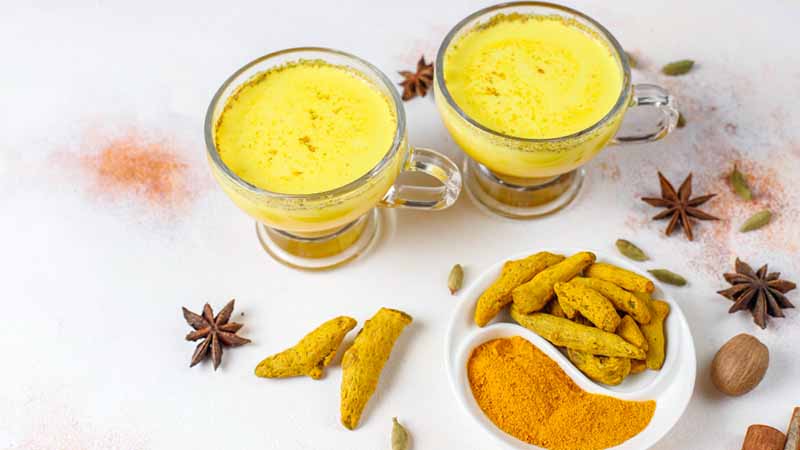Home Care Tips For Early Recovery From H3N2 Infection
- 24 months ago
It's that time of the year again when the flu virus is spreading everywhere, and H3N2 is one of the peskiest strains. H3N2 is a strain of the influenza virus that can cause respiratory illness and flu-like symptoms. Symptoms like cough, fever, nausea, vomiting, sore throat, body pain, and diarrhea are seen in patients.
Infection symptoms may last for five to seven days. H3N2 fever lasts three days, although cough might last up to three weeks.
There are medications available to treat the infection but home remedies can also be effective in easing the symptoms and promoting early recovery.
Some effective home remedies
Here are some effective home remedies to boost your immunity and quick recovery:
Add turmeric to liquids

The curcumin component present in turmeric has anti-inflammatory, antiviral, and antibacterial qualities. Turmeric is an excellent cough and fever treatment. To boost its potency, combine it with black pepper. You can have orange juice, tea, or soup with 1 teaspoon of turmeric and 1/8 teaspoon of black pepper. It is an effective treatment for bronchitis, asthma, and upper respiratory conditions.
Also check: Immunity boosting powder (From everyday kitchen ingredients)
Eating food rich in vitamin C

One nutrient that may be particularly helpful in supporting immune function is vitamin C. Vitamin C is an antioxidant that helps protect cells from damage and supports the production of white blood cells, which are essential for fighting infections.
It may also help reduce the severity and duration of respiratory infections, including those caused by the influenza virus. It is because vitamin C can help reduce inflammation in the body, which can contribute to symptoms such as coughing and congestion.
Gargle with salt water

When you gargle with salt water, the salt helps reduce inflammation and loosen mucus, which relieves symptoms such as sore throat, cough, and congestion. Additionally, salt water may help flush out any irritants or bacteria in your throat, which can reduce the severity and duration of your symptoms.
Gargling with salt water is a simple home remedy that has been used for centuries to relieve various symptoms related to respiratory illnesses, such as sore throat, cough, and congestion. The salt in the water helps to draw out excess fluid from the tissues, which reduces inflammation and eases pain.
Ginger

There are several ways in which ginger may help:
- Anti-inflammatory properties: Ginger contains chemicals known as gingerols and shogaols, which have anti-inflammatory properties.
- Antiviral properties: Ginger has antiviral properties against a wide range of viruses, including influenza viruses like H3N2. It means that ginger may help to prevent the virus from replicating in the body, reducing the severity and duration of the illness.
- Immune-boosting properties: Ginger contains high levels of antioxidants, which can help to boost the immune system and enhance the body's ability to fight off infections.
- Anti-nausea properties: Nausea and vomiting are common symptoms of H3N2. Ginger has been found to have anti-nausea properties and may help to alleviate these symptoms.

Honey and tulsi

Honey has antimicrobial properties that may help fight infections, and its anti-inflammatory effects may help reduce inflammation in the body caused by the flu. It is also used to treat sore throats and coughs.
Tulsi is a herb used for thousands of years in Ayurvedic medicine. It has antiviral, antibacterial, and anti-inflammatory properties, which may help boost the immune system and fight infections. Tulsi is effective in reducing the severity and duration of symptoms associated with the flu, including fever, cough, and sore throat.
Combining honey and tulsi may provide a more potent natural remedy for managing flu symptoms. You can add tulsi leaves to honey and consume them, or you can prepare tulsi tea and add honey as a natural sweetener.
Avoid thick clothes or blanket

Avoiding thick clothes or blankets is recommended because it can cause your body temperature to rise further, leading to more discomfort and potentially worsening your symptoms.
When your body is fighting an infection like H3N2, your immune system raises your body temperature to create an environment that is less hospitable to the virus. If you wear thick clothes or cover yourself with heavy blankets, you may trap in heat, which can cause your body temperature to rise even further.
Instead of wearing thick clothes or blankets, it's better to dress in light, breathable clothing that allows your body to regulate its temperature naturally. It can help you feel more comfortable and prevent your fever from becoming too high.
Food to avoid if you have flu
- Carbonated drinks, cold drinks, squashes, etc.
- Roadside, raw, stale food to prevent infection
- Fried and deep-fried food
- Bakery food items, maida which includes junk foods like pizza, pasta, burgers, and fries
- Processed foods like cheese, and mayonnaise
Also, avoid:
- Alcohol
- Smoking and tobacco
Conclusion
Lack of immunity, contact with an infected person, and seasonal allergies are the reason why someone gets the flu or viral infections. These respiratory infections attack a person as this is the time when the immunity happens to be at its lowest.
Recovering from H3N2 may not be the most exciting thing, but these home remedies can make it a little more bearable. So, grab a warm beverage, settle in for a marathon of your favorite show, and let these remedies work their magic.









